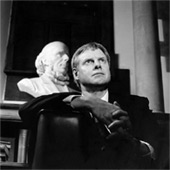 |
 |
|
Best live jobs in the hottest areas of
sciences Materials Science Bioinformatics Pharmacology Synthetic Chemistry Regulatory Affairs Or search all of our jobs and opportunities |
| Meet the people shaping the future of science | ||
| This interview was first published in New Scientist print edition, subscribe here | ||
| Power to the patients! |  Photo: John Angerson | |
|
He found himself sobbing uncontrollably, unable to work a sandwich dispenser and consumed by guilt. Clinical psychologist Richard Bentall had taken a psychiatric drug as part of an experiment. Add in personal tragedy and a spell of depression, and he could never see mental illness the same way again. Now he thinks diagnostic labels have no more predictive power than star signs and that plenty of people can live happily with severe psychotic symptoms. And as he told Liz Else, the people doing the suffering should have power restored to them | ||
|
Saying psychiatry is no better than astrology is a bit strong, isn't it? No. I've tried to show in my book that there is truckloads of research that shows that these categories are meaningless. They are remarkably similar to star signs because people think that star signs say something about them and about what will happen in the future. They think the same with psychiatric diagnoses, which don't predict the course of the illness, which treatments will work, or say anything about aetiology.
Though bodies like the World Health Organisation say there are core definitions for, say, schizophrenia... Those definitions were drawn up by psychiatric committees in smoke- filled rooms, so they are psychiatric folklore institutionalised by committee. They look very precise, but that does not make them scientifically useful. The experiences and behaviour of patients diagnosed as schizophrenic or whatever are understandable in terms of processes that are relatively well known by psychologists. Take two of the most extreme symptoms - delusion and hearing voices. These are usually seen as signs of schizophrenia. But over the past 10 years, research has shown that many more people experience them than we thought.
How many? Two large epidemiological studies in the US and in the Netherlands show that when people go round knocking on doors and doing psychiatric interviews, 1 in 10 say that at some point in their lives they have heard voices.
And they will actually admit this? Yes. Now that is really baffling because it sounds like 10 per cent of the population has schizophrenia. But think about how hearing voices relates to everyday experiences. All of us have an inner voice - this has been understood by psychologists for centuries as inner speech. What's happening to people who hear voices is that they are producing this inner speech in what looks like a normal way, but for some reason are misattributing it to an external or alien source.
What about delusions? The most common type is where the patient believes there is an organised conspiracy to persecute them or to do them harm. There has always been a problem of defining when a belief is delusional, but it seems that a history of victimisation or marginalisation markedly increases the likelihood of developing these beliefs. But perhaps the most striking evidence is that immigrants have a very high risk of paranoid symptoms.
Is that all immigrant groups? My guess is all, but the jury is out. It started off with a study of British Afro-Caribbeans, who have an increased risk of psychosis, especially paranoid psychosis. Depending on the research , they are somewhere between 4 and 10 times as likely to develop psychotic paranoid symptoms as other groups. The most likely explanation seems to be that being an immigrant in a culture that you are not too comfortable with, or which maybe persecutes you, increases your chances of having paranoid delusions. One of the most interesting studies published in the British Medical Journal a year ago found that Afro-Caribbeans in London had a higher rate of psychosis if they lived in white neighbourhoods, but not if they lived in mostly black areas.
If we can understand delusions and voices, are environmental factors back in fashion? Thinking about that led me to two surprising observations. One was that you could only really understand these symptoms if you looked at psychosis as the end point of a developmental pathway. That is not radical: even the biological people may buy that. The other thing that really shocked me was that I had believed the textbooks, that nobody had proved an environmental influence on psychosis. But buried in the literature is a lot of evidence of environmental factors. It is common sense that being persecuted will make you paranoid. When you are traumatised, it can generate a flood of intrusive thought and it is probably that that makes patients mistake inner speech for an external voice. And blows to self-esteem in development increase the probability of getting mood problems, while problems in regulating sleep seem to increase vulnerability to mania. So there is a coherent story to be told about how all these symptoms are related to developmental processes, which will undoubtedly include neurobiological factors, but also some major environmental determinants.
How do you differ from the anti-psychiatry advocates of the 1960s and 1970s? In a word - I am a scientist. The anti-psychiatrists R. D. Laing and Aaron Esterson were very insightful but they couldn't do research to save their lives. Laing was extraordinarily imaginative, a genius at relating to patients, but didn't know when his ideas were inconsistent. The idea that madness is understandable was his real contribution.
So you want to keep your distance? My approach is grounded in a lot of experimental research. That is why, although I've tried hard to make my book readable to the non-specialist, the reference section is over 100 pages long. Because I am saying things a lot of people will not want to hear so it's important to show that my ideas have come from research.
Was some of that research a bit personal? I was involved in an experiment by a colleague, David Healy, at the North Wales Hospital in Bangor. We took a very low dose, 5 milligrams, of droperidol, very similar to the widely used drug haloperidol. Parts of the study were never completed because nearly everybody had a terrible reaction to the drug. Mine was not the most extreme. There was a psychiatrist who became so deeply depressed that she was put under observation.
What happened to you? I drank this stuff and I felt lethargic and sedated. I thought I had got away with it. Then a psychologist walked in and said: "Oh, this is embarrassing, Richard, but we'd like you to fill in this test." The embarrassing thing was I had designed the test myself 10 years earlier. I looked at it and I could as soon have climbed Mount Everest. I felt a sense of depression and hopelessness but also an inner sense of restlessness and agitation. It was a combined wanting to do something and not being able to. Then she said: "You don't look too well - would you like some lunch?" I interpreted that as an order - and I've read since that people on neuroleptic drugs take statements as orders. So I said yes. Then she said: "We've a sandwich machine - will that do?" And I said yes because it was all I was up to saying. But I couldn't get the energy to decide what money to use. I just grabbed a coin and it was enough to get a Mars bar, which I was too ill to eat.
Did the drug wear off? I had to do these neuropsychological tests, and it was embarrassing, but I burst into tears halfway through. I started weeping uncontrollably, so much so that I was given an anticholinergic drug as an antidote and David took me out to get some fresh air. I suddenly felt I had to tell him about all the things I had ever felt guilty about. Then I went back and fell asleep for 3 hours. I woke up with a woozy hangover, like there was a glass wall between me and the world and that lasted for about a week after a single dose. The akathisia - the combined agitation and depression I felt - is experienced by 40 per cent of patients. It tends to go away after about a week, but imagine: you've had a crisis, you're admitted to hospital, you're hearing voices, then someone gives you a drug that makes you feel like that!
But they are designed for sick people... About 40 per cent of patients have the same experience. That's the great unasked question of psychiatry: what was it like for you? Patients' experiences have been completely ignored.
So are the antipsychotics effective? It's more complex. There's no doubt these drugs help some people by reducing the hallucinations and delusions. But there are really important caveats. First, something like 30 per cent of patients get benefits from the drugs - and we don't know which ones they will be. Secondly, these drugs have the most horrendous side effects. The old type of antipsychotic drugs produced what we call extrapyramidal effects, including Parkinsonian tremors, tardive dyskinesia (uncontrolled movements of the mouth and tongue) and akathisia.
But surely you just give low doses? There is a scandal which I must get on my soapbox about - neuroleptic dosage. These drugs were discovered in the late 1940s and in wide use by the 1950s. Bizarrely, the first studies to look at the most appropriate dosage were not published until the 1990s. It turned out that low doses work at least as well as high doses. And for much of that period it wasn't uncommon to find patients on 80 to 90 milligrams of haloperidol. We now consider it irrational to give more than 10 milligrams and better to keep it at 5 milligrams a day, although you can still find patients on higher doses. We've got a massive amount of drug-induced illness - millions of people - and some of them have even been sent to early graves because of the increased risk from heart attacks and various blood disorders. All completely unnecessary.
What about the new antipsychotics? It turned out the new drugs looked great compared to irrational doses of the old ones, but when compared to rational doses there was hardly any difference. The new drugs don't produce the old side effects, but there are a load of new ones: diabetes, sexual dysfunction, weight gain. I'm not saying drugs never work. If you talk to patients, some will tell you that drugs are a lifesaver and others that drugs have made their lives worse. Quite a few patients now on drugs would be better off without. Perhaps the best thing is to encourage patients to try them and let them decide.
How far can you take this? What about when people are forcibly admitted to hospital? The first question is, do they need to be? In a lot of circumstances it can be avoided by engaging people in the right way. Why do patients get forcibly admitted? Because they refuse treatment. And why do they refuse? Because lots of psychiatric treatment is crap, it is abusive and horrible.
So put the lunatics in charge of the asylum? Maybe we should! If we had patients helping to manage services, it would guarantee better services. I think patients should protest more and there should be more progressive services, like the one in Bradford where they have patients - "service users" as they call them - sitting on psychiatric team meetings, involved in decisions.
What makes you identify with the patients? Basically in the space of a few years in my late twenties, my father was killed in a car smash, I got divorced, my brother Andrew committed suicide and I became depressed. People are nervous about the influence of the family: a psychologist once told me my research was dangerous, that I was reviving the idea that families cause psychosis. The thing is, getting from one end of your life to the other is about negotiating a series of obstacles. Some find it more difficult than others. I wanted to get away from the idea that we are a professional elite who have all the answers. It's not how I feel. And to some extent I talk about my own experiences as an illustration of that. But it's deeply difficult to talk about. As I talk I feel this emotional knot.
And did you seek psychiatric help? Yes. It was an amazing experience. It was scary. I remember sitting in the waiting room. I remember the anxiety of sitting there and wondering what people were thinking of me. They must think I'm mad. Do they think I'm weird? And trying to look normal by holding a big academic textbook! Then I thought: "This is what people go through waiting to see me." |
 |
|
|
|
|
|
Mays Swicord spent 26 years trying to find
possible health risks of mobile phones. Now he's sure there aren't
any, but why did he change his mind? |
 |
|
Since she started to question the reliability of
repressed memory theory, Elizabeth Loftus has lost her job
and made some unexpected enemies | |
|
Richard Bentall is an unusual clinical
psychiatrist. After experimenting with medication on himself, he has
concluded that much of psychiatry is no more useful than
astrologyÊ | |
|
Brian Marsden of the Minor Planet Center
pays tribute to the thousands of amateur skywatchers whose
persistence is vital to astronomy Ê | |
|
Iran's rulers do not take kindly to alternative
interpretations of Islam. Philosopher of science Abdolkarim
Soroush found out the hard way Ê | |
|
All interviews are available in our online
archive. If you are not already a subscriber enjoying unlimited
archive
access, please try our seven day free
trial | |
 | |
|
About newscientist.com •
Subscribe •
Contact Us •
FAQ •
Media Information •
Disclaimer •
Terms and Conditions •
Site Map •
Privacy Policy
© Copyright Reed Business Information Ltd. |